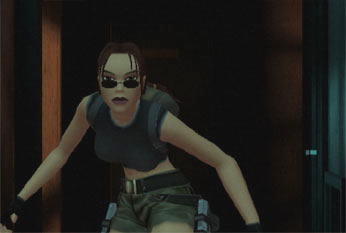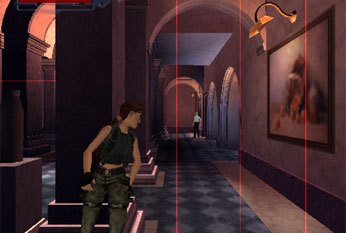Watch
your
step,
Lara.
I’ve
always
pictured
Lara
Croft
as
the
type
to
wade
into
a
fracas
with
both
guns
blazing,
asking
no
questions
and
taking
no
prisoners.
And
it’s
been
perplexing
that
someone
possessing
her
amazing
physical
prowess
would
be
as
helpless
as
a
kitten
when
left
without
a
firearm.
However,
it
never
occurred
to
me
that
what
was
missing
was
an
ability
to
tip
around
as
silent
and
sneaky
as
a
ninja,
peering
around
corners
and
creeping
up
on
foes
from
behind.
Since
she
never
went
up
against
anything
that
actually
deserved
the
reverence
of
stealth,
there
was
never
much
incentive
to
sneak.
Well,
the
good
folks
at
Core
—
apparently
bitten
by
the
Solid
Snake
bug
—
have
opted
to
add
a
stealth
element
to
the
game,
in
addition
to
a
bevy
of
other
new
features
that
probably
no
one
on
Earth
thought
were
missing.
The
result
is
Tomb
Raider:
Angel
of
Darkness,
a
hodgepodge
of
odd
gaming
options
that
never
actually
coalesces
into
a
satisfying
adventure.
The
story
here
revolves
around
our
heroine
Lara
Croft
having
been
framed,
Max
Payne
style,
for
the
murder
of
her
mentor,
Professor
Von
Croy,
as
well
as
for
the
deaths
of
a
number
of
others
unfortunate
enough
to
enter
into
the
adventurer’s
company.
The
tale
also
features
cultists
and
several
paintings
with
occult
associations
and,
though
aptly
moved
along
by
numerous
cut
scenes,
it
never
manages
to
build
to
a
captivating
crescendo.
Nevertheless,
it’s
a
far
cry
from
some
of
her
previous
nonsensical
adventures
and
a
good
deal
more
mature
in
nature.
In
addition
to
exploration
through
Paris,
Prague
and
the
catacombs
of
Europe,
players
will
encounter
the
obligatory
puzzles
—
although
these
are
much
more
intuitive
and
not
nearly
as
mind-meltingly
difficult
as
those
in
previous
games.
Speaking
with
or
performing
a
task
for
other
characters
will
help
you
to
solve
many
of
the
puzzles.
This
is
a
definite
plus
to
anyone
familiar
with
Miss
Croft’s
earlier
exploits.
Of
course,
you
will
still
be
seeking
elusive
keys
to
open
a
series
of
doors,
but
you’ll
never
find
yourself
having
to
execute
blind
backflips
up
narrow
chimney-like
passageways
in
order
to
obtain
them.
The
game
indeed
looks
better
than
earlier
installments
in
the
series.
Environments
are
suitably
creepy
and
dark,
or
impressively
expansive.
Effects
such
as
rain,
smoke
and
water
have
definitely
improved.
The
characters
are
passably
well
rendered,
including
a
new
playable
character
named
Kurtis
Trent.
Everyone
seems
to
fare
better
than
poor
Lara
who
still
resembles
nothing
more
than
a
bubble-headed,
alien-eyed
refugee
from
Captain
Scarlet
and
the
Mysterons.
However,
there
are
still
graphical
glitches
and
players
will
notice
a
variety
of
clipping
errors
and
a
good
amount
of
slow
down,
at
times
ití¢â‚¬â„¢s
almost
like
playing
the
game
in
slow
motion.
The
item-ring
which
was
a
standard
in
the
TR
series
is
mournfully
absent
here,
replaced
by
a
standard
item
menu,
which
increases
the
chances
that
you
will
collect
items
without
knowing
what
they
are
and
then
have
difficulty
finding
them
later.
There
is,
however,
a
helpful
hand
icon
which
will
now
appear
to
indicate
objects
with
which
you
are
capable
of
interacting,
and
this
is
bound
to
minimize
some
of
the
frustrations
of
exploration.
Unfortunately,
the
hand
icon
never
disappears,
even
after
an
object
has
ceased
to
be
useful
or
a
particular
box
or
cupboard
has
yielded
all
of
its
useable
contents.
Lara
now
allegedly
gets
more
powerful
as
you
play
the
game.
These
increases
are
not
optional,
they
are
necessary
to
proceed
in
the
game,
and
they
are
also
something
that
must
be
taken
on
faith
as
you’re
never
actually
presented
with
stats
to
view.
She’ll
simply
tell
you,
“I
feel
stronger
now,”
which
indicates
that
some
ability
has
increased
but
there’s
usually
no
telling
precisely
what
precipitated
the
change
or
why.
She’s
simply
stronger
than
she
was
30
seconds
ago
and
so
can
perhaps
jump
farther,
hang
on
longer
or
move
a
particular
object
that
she
couldn’t
move
before.
This
can
be
frustrating,
since
figuring
out
Laraí¢â‚¬â„¢s
new
ability
by
trial
and
error
can
lead
to
a
lot
of
reloading
saved
games.
 When
When
it
comes
to
control
set-up,
TR:AoD
has
one
of
the
worst
of
any
game
in
living
memory.
To
incorporate
her
new
stealth
and
hand-to-hand
combat
moves
(and
perhaps
just
to
be
obstinate),
Lara’s
controls
have
been
completely
rebuilt
from
the
ground
up.
Reliance
on
the
analog
stick,
while
an
option
in
previous
games,
is
now
absolute.
This
is
unfortunate
as
D-pad
control
was
always
far
more
accurate.
The
new
Lara
seems
completely
incapable
of
grasping
the
concept
of
backing
up,
instead
she
rotates
—
not
fluidly,
but
in
fits
and
starts.
Just
getting
her
correctly
positioned
for
a
jump
is
a
frustrating
ordeal
and
certainly
not
suited
to
an
action
game
where
precise
control
is
key.
The
once
sure-footed
Lara
is
now
prone
to
stumble
off
of
planks
and
accidentally
hurl
herself
over
railings.
To
offset
this,
they
have
implemented
a
walk
toggle
which
will
prevent
her
from
falling
but
has
its
own
irritations,
especially
when
you’re
locked
into
a
walk
and
need
to
make
a
sudden
run.
At
times
Lara
will
muster
the
fortitude
and
presence
of
mind
(or
foot)
to
actually
kick
in
a
door
to
gain
entry.
Later
she
will
encounter
an
identical
door
and
make
you
go
look
for
a
key
instead.
You
can
also
count
on
her
to
inexplicably
dummy
up
on
obstacles
a
two
year
old
could
accidentally
knock
over,
or
be
completely
blocked
by
objects
that
an
old
codger
with
arthritis
in
both
knees
and
a
hip
replacement
could
easily
scramble
over
or
under.
To
make
matters
worse,
there
still
remains
that
torturous
lag
between
pressing
a
button
and
Laraí¢â‚¬â„¢s
actual
execution
of
a
move
which
plagued
previous
TR
games.
At
least
you
always
have
the
option
to
save
your
game.
This
is
necessary
because
the
faulty
control
will
keep
you
dying
on
a
regular
basis.
Fortunately
for
the
new
stumblefoot
Lara,
her
opponents
put
up
almost
no
resistance
at
all.
Although
she
now
possesses
a
few
lame
stealth
abilities
and
several
new
and
poorly
implemented
hand-to-hand
combat
maneuvers,
you
can
hardly
believe
she
needs
them
because
the
enemies
you
encounter
are
the
usual
assortment
of
dead
bulbs
who
will
permit
themselves
to
be
peppered
with
bullets
without
ever
entertaining
the
notion
of
duck-and-cover.
A
few
stiffly
executed
kicks
will
knock
them
right
over
and,
once
deceased,
their
bodies
will
flash
arcade-style
and
then
simply
vanish.
So
much
for
realism.
When
compared
to
its
predecessors,
TR:AoD
is
about
as
short
as
Herve
Villechaize
kneeling
in
a
pothole.
However,
that
may
be
a
blessing.
Despite
its
new
look,
fairly
interesting
storyline,
and
a
bucket
load
of
new
moves
and
features,
this
game
is
fatally
flawed
by
the
completely
revamped
control
system
which
makes
it
a
nightmare
of
frustration.
Hopefully,
the
controls
will
be
overhauled
yet
again
before
Ms.
Croft
goes
on
her
seventh
spelunking
installment.

-
Improved graphics
-
Decent storyline
-
New hand-to-hand combat skills
-
More intuitive puzzles
-
Helpful Hand Icon
-
Controls from hell
-
Unnecessary stealth maneuvers
-
Silly stat increases
-
No more item ring







